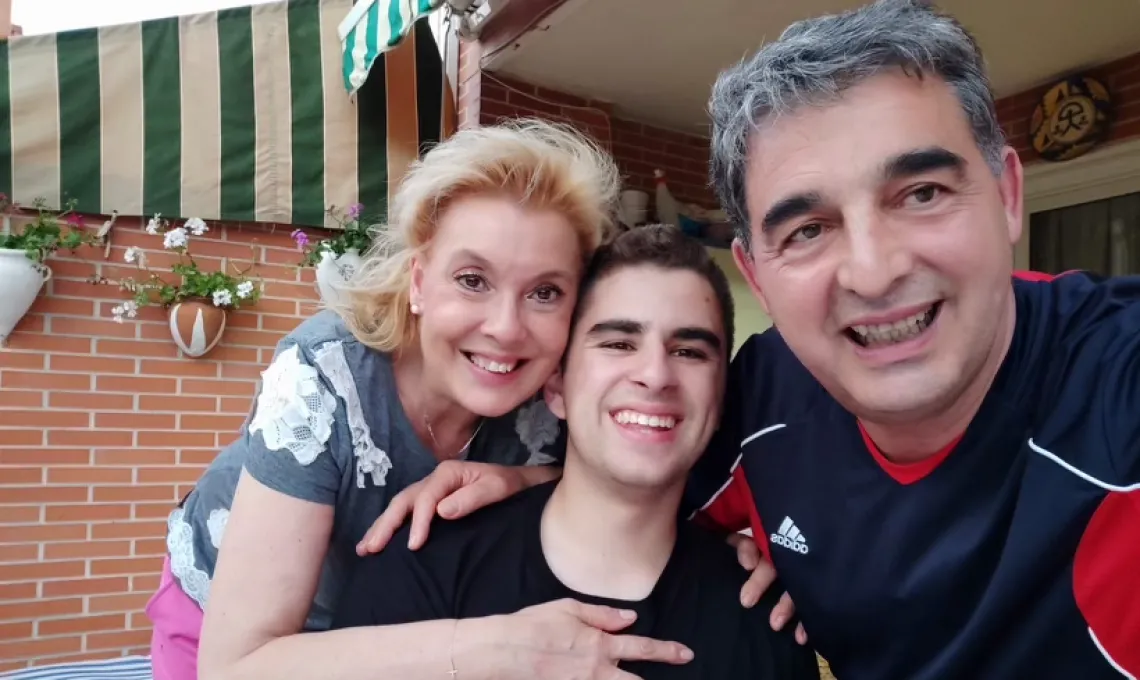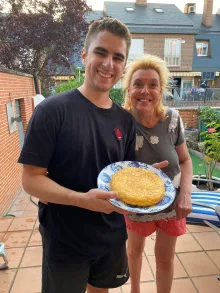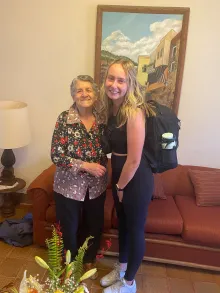Finding Your Home Away from Home: A Guide to Choosing Study Abroad Housing
In her study abroad blog, AZI intern Kylie shares her experiences and advice for students studying abroad.

Study abroad student Aaron spent five weeks in Valladolid, Spain with his host family. When choosing to study abroad, practicing Spanish outside of the classroom was very important to him, and he knew a homestay experience would be a great way to do this.

When departing for UA Barcelona, I was simultaneously excited and anxious. I was embarking on an adventure I had dreamed about for years; however, I had chosen to go abroad a different semester than any of my friends, meaning I was headed to a new country without the comfort of any familiar faces.
Within a few days of arriving, any nerves I had about making friends had disappeared: my randomly assigned roommates very quickly became my home away from home and a highlight of my study abroad experience.
I had the housing options of a homestay or a shared student apartment. I chose UA Barcelona’s shared apartment-style housing as I had not taken Spanish classes in about three years, so I felt I was likely not conversationally proficient enough in the language for a homestay.

Photos of Kylie and her study abroad roommates in Rome, Lisbon, Granada, and back at University of Arizona.
I was assigned a four-bedroom and four-bathroom apartment with six roommates and a shared living room, kitchen, laundry patio, and balcony. Including our apartment, the building had eight units of UA Barcelona students, meaning we had an instant community of nearby friends. This housing setup made the transition abroad very natural, as I didn’t have to worry about the language barrier as often and was surrounded by peers in the same situation as me.
If I could go back and do it again, I would undoubtedly choose the same housing as it led to new close friends, but I do also recognize that this choice meant I was less integrated into the Spanish culture and may have missed out on some personal growth experiences because I was comfortably surrounded by English-speaking students from the same university as me.
When choosing housing for study abroad, some questions I encourage you to ask yourself are:
● What are your personal goals and expectations for studying abroad?
● Are you an experienced international traveler?
● What is your level of comfort with the language spoken in your host country?
These questions are a great place to start when evaluating what study abroad housing type will suit you best. Read on for details on the housing selection process, as well as some benefits, drawbacks, and considerations to both student housing and homestays.
The Housing Selection Process
To explore what housing options your program has to offer, visit the Location & Housing tab on your program’s webpage. Specific housing options vary for each program, but for many programs you have an option to live amongst other U of A students or in a homestay.
It is also important to note that some programs guarantee you housing, but others do not. For instance, when I applied for UA Barcelona, I was guaranteed some form of housing after selecting an apartment over a homestay. Conversely, UA Sydney only offers limited on-campus housing, and when I was not selected for this housing, I was responsible for finding my own housing in an off-campus apartment. Although this seemed intimidating at first, Sydney has multiple chains of well-known, student-only apartments, and I was able to find an accommodation through Scape where I will have my own room and bathroom along with four other roommates who may be students from all across the globe!
My Experience in Shared Housing with UA Students
Since I lived with students from my program, it meant we also all wanted to travel in our free time. My roommates and I grew even closer through late night trip planning and exploring new countries together almost every weekend. Saying goodbye at the end of our semester was hard, but the best part was I was able to come back to Tucson with a whole group of new friends.Due to my lack of language knowledge and my desire to connect with other students to travel with, choosing an apartment with other students in my program was the best decision for me at the time. That said, I will likely be with students from many different countries at my apartment in UA Sydney, and am excited about the opportunity to learn about many new cultures in my future home.
Homestay Stories
As I do not have personal experience in a homestay, I reached out to three friends: Abby who studied at UA Barcelona with me, Aaron who studied in Valladolid, Spain, and Abbey who studied in Guanajuato, Mexico, to learn about their homestay experiences.
Abby lived in a flat with host parents and one of their daughters in Barcelona. In her homestay, she had her own room and a shared bathroom with her host sister. Abby shared that she had an amazing experience abroad and believes that “you can have such a special experience regardless of whether you are staying with a homestay or staying in an apartment.”
This said, she did face some difficulties adjusting to living abroad as she was not housed with any other students in her homestay. Abby explains that her first challenge was not having “roommates that were going through the same process that I was.” Due to this, she really had to put herself out there in order to make friends and didn’t have anyone to relate to when experiencing homesickness. Another challenge was communicating with her host family, as her Spanish was very poor and her host family did not speak English.
Despite these initial challenges, she was able to make many friends to lean on and travel with through her classes and also experienced extra immersion in local Spanish culture through her homestay. On a regular basis, she would sit with her host family to learn about their days and experience traditional Spanish meals. A specific special experience Abby shared that stuck out to her was a fun birthday party she attended with her host family.
Some advice Abby would share with those heading to live in a homestay abroad is to be respectful of their home and rules, communicate your daily and travel plans with your host family, and work to overcome any language barrier so you can truly “form a relationship with your host family and learn about their culture.”

Aaron and his host mom.
The next student I spoke to was Aaron, who studied abroad for five weeks in Valladolid, Spain, over the summer to take courses towards his Spanish minor. When choosing to study abroad, practicing Spanish outside of the classroom was very important to him, and he knew a homestay experience would be a great way to do this.
In his homestay, he stayed with a Spanish-speaking host mom and dad which really pushed him to advance his Spanish skills. Aaron describes his host parents as very welcoming, caring, and inclusive, treating him just like a son during his time there.
Aaron was nervous about the language barrier at first as most of his experience speaking Spanish was in the classroom. However, Aaron shares “my host parents helped me find the right words to round out my ideas which quickly helped me overcome this fear.”
According to Aaron, “My host family was very helpful with everything. They really made the effort to make me feel at home in every way which took any outside stress out of the equation.” Some memorable, unique experiences Aaron shared with his host family included visiting his host dad’s hometown to learn about his upbringing in a nearby rural area, watching soccer with his host family, visiting his host parents’ local butcher shop business, and learning how to make tortilla de patatas with his host mom, which he was then able to make for his family when he returned home.
Aaron shared some advice for people heading to study abroad in a homestay: don’t be afraid to make mistakes in your language speaking – your host family wants to help you learn! He also encouraged future study abroad students to ask questions and lean into this once in a lifetime experience.

Abbey and her host mom.
The final student I interviewed from a homestay was Abbey who traveled to Mexico City and Guanajuato with the Verano in Mexico program to learn about the education system in another culture. During her program, Abbey lived with a host mom and three other U of A students.
Going into her study abroad experience, being fully immersed in a different culture was very important to her, and it led her to choose a program that was partially based in a smaller city with the hopes she would be able to learn from the locals. Abbey went to Mexico the summer after her freshman year, and some fears she had going into the program were that she had never been out of the country alone before and did not speak fluent Spanish.
When first arriving, Abbey learned she was the only person in the house that didn’t speak fluent Spanish, but “my host mom was so willing and wanted to help me learn. She would do her best to help translate things into English, but she would also make me speak to her in Spanish so that I could learn.”
When asked what benefits and drawbacks she got from being in a homestay, Abbey shared that “you get to know the culture better as it’s a lot more immersive.” The only small drawback she described was slightly less freedom than she was used to as a college student, however the benefits far outweighed this as she explains she definitely practiced the language a lot more than she would have in an apartment and also got to try a lot of new, amazing food as her host mom made breakfast and lunch everyday!
Some notable memories she shared from her homestay experience include meeting her host mom’s family, and eating delicious meals her host mom made that accommodated her vegetarian diet. Abbey also got to meet other students studying Spanish from around the world in her homestay as her host mom had another room where she’d host international students from another university.
Abbey’s advice for students heading to study abroad in a homestay is to “be adaptable and open to living the way your host family does while you are living in their home.”
Conclusions
No matter if it’s a host family or other student roommates, each option offers many unique and valuable experiences. The most important thing when choosing is considering your needs and desires for the study abroad experience. If being fully immersed in the culture and language is the number one priority for you, a homestay may suit you best. On the other hand, if connecting with students your own age who can help you adjust to living abroad with ease is the most important thing to you, apartment-style housing with other students may be a better fit.
Whichever option you choose, the key to making the most of your study abroad housing is to have an adaptable mindset. If you open-mindedly embrace your roommates or host family, you are sure to make connections with people from diverse backgrounds to share your adventures abroad with!
To access all of the study abroad blog entries, visit the Kylie Goes Global webpage.

